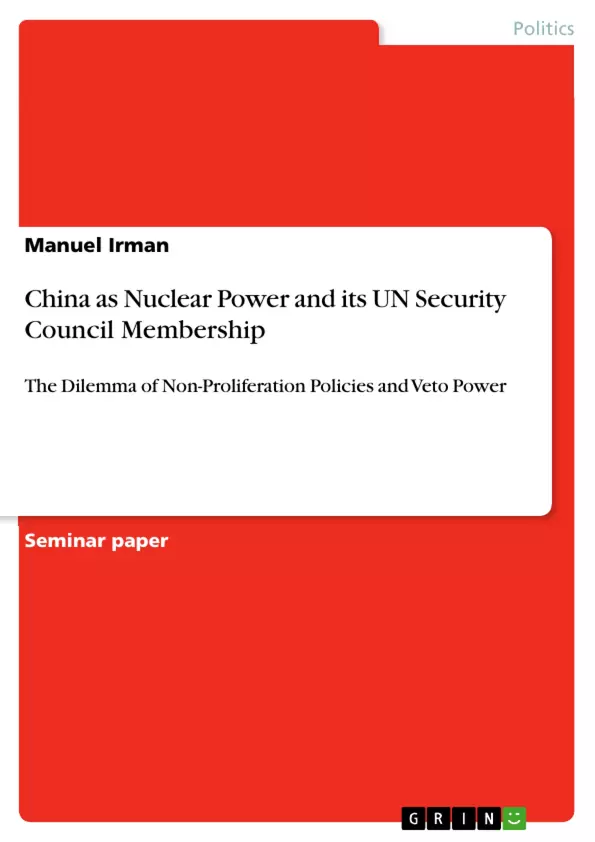Since 1964, the People’s Republic of China (PRC) is a nuclear power and its government increasingly became the internationally acknowledged and legitimate bearer of power. In 1971, the PRC replaced the Taiwanese representatives in the United Nations General Assembly (UNGA) and the United Nations Security Council (UNSC). The PRC is now one of five permanent members in the UNSC and seemingly holds this status due to its possession of nuclear weapons. Thus, is it true that China’s permanent UNSC-membership stalls improvements in complying with disarmament and non-proliferation policies? George Tsebelis’ theory (Veto Players) supports the finding of an answer.
Inhaltsverzeichnis (Table of Contents)
- Introduction
- Theory and History
- Chinese Nuclear and Veto Power
- Chinese Multilateralism
- Nuclear Weapons and Non-Proliferation Policies
- Organisational Matters in the UNSC
- Conclusion
Zielsetzung und Themenschwerpunkte (Objectives and Key Themes)
This paper examines the interplay between China's nuclear weapons policy and its permanent membership of the UN Security Council (UNSC), specifically focusing on the potential negative influence of the veto power on non-proliferation efforts.
- The historical development of China's nuclear program and its significance within the context of the Cold War and international relations.
- The impact of China's UNSC veto power on its nuclear policy and non-proliferation efforts.
- The complexities of balancing national security concerns with international obligations regarding nuclear weapons.
- The role of international institutions and treaties in regulating the proliferation of nuclear weapons.
- The implications of China's nuclear posture for regional and global security.
Zusammenfassung der Kapitel (Chapter Summaries)
- Introduction: This chapter sets the stage by outlining the historical context of nuclear weapons and their profound impact on international relations. It introduces the concept of mutually assured destruction (MAD) and highlights the significance of China's nuclear development in shaping its role in global affairs.
- Theory and History: This chapter delves into theoretical frameworks relevant to the analysis of nuclear weapons and veto power in the UNSC. It discusses Herman Kahn's “escalation ladder” and Daniel L. Byman and Mathew C. Waxman's “Dynamics of Coercion,” while emphasizing the importance of George Tsebelis' “Veto Players” theory for understanding China's position as an individual veto player within the UNSC.
- Chinese Nuclear and Veto Power: This chapter explores the complexities of China's nuclear and veto power, examining aspects of its multilateralism, nuclear weapons and non-proliferation policies, and the organizational structure of the UNSC.
Schlüsselwörter (Keywords)
This paper focuses on key concepts including: nuclear weapons, non-proliferation, China, UN Security Council, veto power, international relations, multilateralism, nuclear deterrence, international law, and national security.
Frequently Asked Questions
When did China become a nuclear power?
The People’s Republic of China (PRC) has been a nuclear power since 1964.
What is the connection between China's nuclear status and the UN?
China is one of the five permanent members of the UN Security Council (UNSC), a status often linked to its possession of nuclear weapons.
What is George Tsebelis’ Veto Players theory?
It is a political theory used in the paper to analyze how China, as an individual veto player, can influence or stall international disarmament policies.
Does China's UNSC membership hinder nuclear disarmament?
The paper investigates whether China’s veto power stalls improvements in complying with global disarmament and non-proliferation policies.
What are China's challenges in balancing security and international obligations?
China must balance its national security concerns and nuclear deterrence with its role and responsibilities within international institutions and treaties.
- Arbeit zitieren
- M.A. Manuel Irman (Autor:in), 2011, China as Nuclear Power and its UN Security Council Membership, München, GRIN Verlag, https://www.hausarbeiten.de/document/181143


